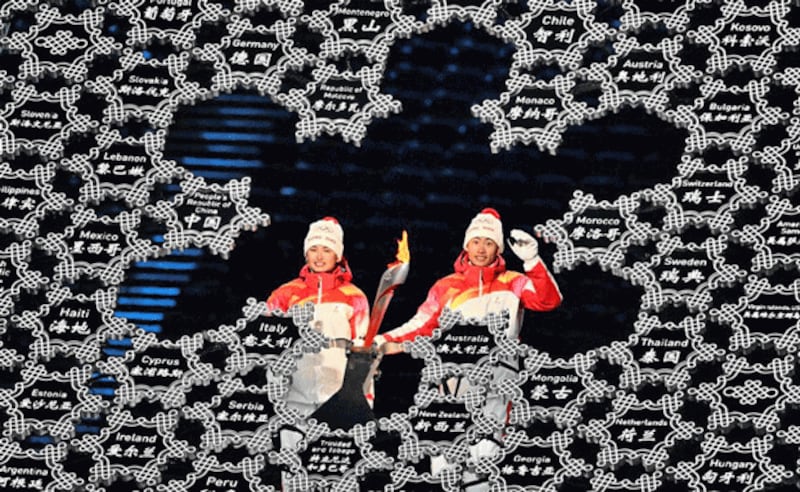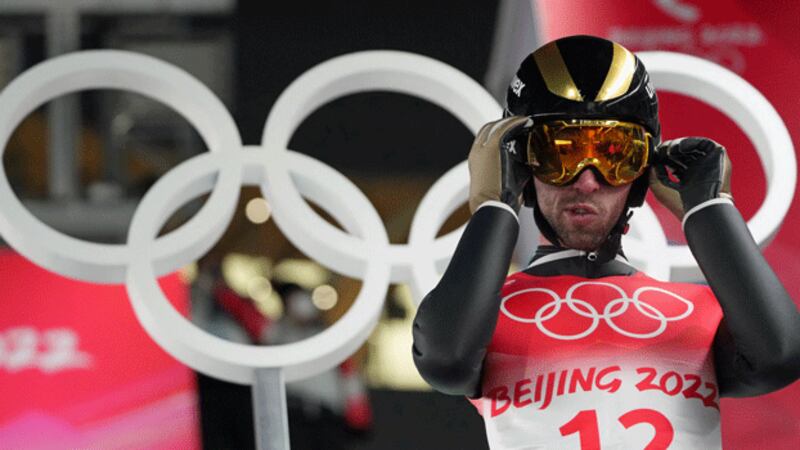China asked a Uyghur athlete to light the Olympic cauldron at the opening ceremony of the Beijing Winter Games to distract viewers from the genocide of the predominantly Muslim Uyghurs in China’s far-western Xinjiang region, the U.S. ambassador to the United Nations said.
“This is an effort by the Chinese to distract us from the real issue here at hand, that Uyghurs are being tortured and Uyghurs are the victims of human rights violations by the Chinese. And we have to keep that front and center,” Ambassador Linda Thomas-Greenfield told chief White House correspondent Jake Tapper on CNN’s “State of the Union” on Sunday.
Cross-country skier Dilnigar Ilhamjan, also spelled as Dinigeer Yilamujiang, was the final torchbearer along with Zhao Jiwen, a skier from China’s dominant Han majority, at the opening ceremony on Feb. 4, as Chinese President Xi Jingping looked on.
Dilnigar Ilhamjan, a 20-year-old from Altay (in Chinese, Aletai) prefecture in Xinjiang, competed in the women’s 7.5km + 7.5km skiathlon on Feb. 5 in Zhangjiakou, finishing 43rd out of 65 participants. She later declined to meet with reporters, even though Olympic athletes typically answer questions after their performances.
More than a dozen countries, including the U.S., decided not to send governmental representatives to Beijing to protest China’s dismal human rights record, including its persecution of the Uyghurs.
The U.S. and lawmakers from other Western nations have declared that China’s violence against the Uyghurs and other Turkic minorities in Xinjiang constitutes genocide and crimes against humanity. Beijing has denied the accusations and has said countries like the U.S. are trying to politicize the Olympics.
“This is not business as usual,” Thomas-Greenfield said. “We know that a genocide has been committed there. We’ve called them out on it. [President Joe Biden] has called them out on it. And we’ve made clear that crimes against humanity are being committed in China,” she said.
When asked by Reuters at a press conference on Monday if the selection of a Uyghur torchbearer was intended to be symbolic, Foreign Ministry spokesman Zhao Lijian said there were clear criteria for selecting torchbearers for the Games, including competitive results, age, popularity and ethnicity, to ensure broad representation.
“At the opening ceremony, the Olympic flame passed through three generations of Chinese athletes, representing the continuation and inheritance of the Olympic spirit,” he said. “We are glad to see athletes from all ethnic groups, including Dinigeer Yilamujiang, join the Chinese delegation for the Beijing Olympic Winter Games.
“This reflects that China’s policy of vigorously developing winter sports and promoting people’s health is benefiting people of all ethnic groups, and that China is a big family boasting ethnic unity,” the spokesman said.
Zhao went on to say that the “so-called genocide in Xinjiang is the biggest lie of the century.”
“The above-mentioned remarks of some American politicians about ‘human rights abuses against the Uyghurs’ are nothing less than lying through their teeth,” he said.

UN secretary-general’s request
A day before Thomas-Greenfield’s comments, U.N. Secretary-General António Guterres told Xi and Foreign Minister Wang Yi on the sidelines of the Olympic Games that he expected them to allow U.N. human rights chief Michelle Bachelet to visit China, including Xinjiang, according to a U.S. readout of the meeting.
Guterres, who supported the Winter Games being held in Beijing, “expressed his expectation that the contacts between the office of the High Commissioner for Human Rights and the Chinese authorities will allow for a credible visit of the high commissioner to China, including Xinjiang,” it said.
For about three years, Beijing has denied Bachelet unfettered access to Xinjiang to conduct an independent assessment of the situation there.
A statement by the Chinese Foreign Ministry about Guterres’ meeting with Xi omitted the secretary-general’s request and said that he commended China for successfully organizing a large and safe Winter Olympics.
Dolkun Isa, president of the Germany-based Would Uyghur Congress, said he was surprised that the U.N. secretary-general urged the Chinese government to let Bachelet visit Xinjiang, given Guterres’ “silence over the Uyghur genocide in the past four years, in spite of international condemnation of China’s atrocities.”
“We welcome his statement because the U.N. has the ultimate authority to investigate atrocity crimes in countries where they’re taking place,” he told RFA. “China has denied the U.N.’s legitimate request to investigate the crimes against Uyghurs in the past three years under all kinds of pretexts.”
Of the 176 athletes competing in the Olympics for China, 20 represent Uyghur, Tibetan, Hui and other ethnic minority groups.
Meanwhile, many Uyghurs applauded Turkish ski jumper Fatih Arda İpçioğlu for wearing a helmet and skis that appeared to display the flag of the independence movement of East Turkestan, the Uyghurs’ preferred name for the Xinjiang region for which they aspire to gain independence from China and establish their own nation.
The flags of Turkey and East Turkestan are similar. Both feature a white crescent and a single white star, though Turkey’s are set against a red background and East Turkestan’s are on a light blue background. Olympic rules forbid displays of political and religious symbols as well as unofficial flags.
The 24-year-old wore the gear when he competed on Saturday. A day later he declined to say if the crescent and star on his blue skis was a statement in support of China’s Uyghurs, the Associated Press reported.
Bülent Aksoy, an economics professor at Haci Bahram University in Ankara, Turkey, tweeted in Turkish: “The first Turk, Fatih Arda İpçioğlu, to qualify in ski jumping branch at the Winter Olympics, competed with the East Turkestan flag on his helmet and skis, protesting the Chinese persecution in China. Congratulations, Fatih Arda.”

PLA Olympic torchbearer
A Chinese People’s Liberation Army soldier who served as a torchbearer on Feb. 2 during the Winter Olympics torch relay also raised concern because of his involvement in a deadly clash between Chinese and Indian security forces in a disputed area of the Himalayan Mountains in June 2020.
Qi Fabao sustained head wounds in the conflict in the Galway Valley, which marked the first time soldiers were killed in a confrontation between the two militaries in more than four decades.
On the eve of the start of the Games, India announced that its top diplomat in China would skip the opening and closing ceremonies because of the decision to let Qi carry the Olympic torch.
Chinese government spokesman Zhao Lijian repeated that the Olympic torchbearers must meet selections standards and broadly represent China.
“What I want to say is that we hope [the] relevant party can view the torchbearers in an objective and rational way and refrain from making [a] politicized interpretation,” he said.
But Arindam Bagchi, spokesman and joint secretary of India’s Ministry of External Affairs, said it was China that had chosen to politicize the Winter Olympics, which is why the charge d’affaires of the Indian Embassy in Beijing would not attend either the opening or closing ceremonies.
India’s public broadcaster, Doordarshan, also announced that it would not present a live telecast of the ceremonies.
Having Qi Fabao participate as a torchbearer “clearly shows the desperate act on the part of China attempting to politicize the Games,” said veteran journalist Aditya Raj Kaul.
Translated by Alim Seytoff for RFA’s Uyghur Service and Tenzin Dickyi for RFA’s Tibetan Service. Written in English by Roseanne Gerin.
